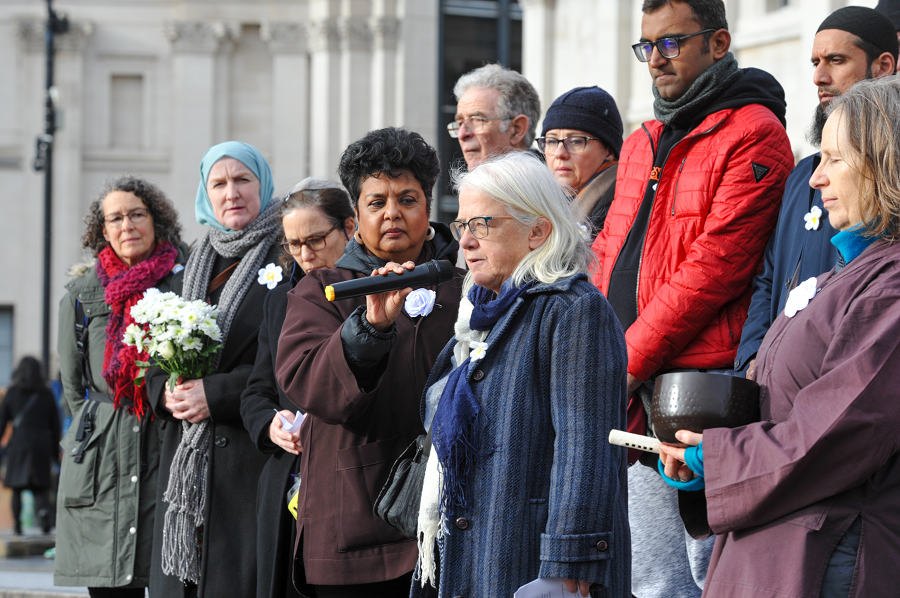Media Officer for Quakers in Britain Cato Pedder writes…
Facilitated by Quakers in Britain and Plum Village UK, the event, open to all, called for peace amidst the rising challenges of hatred, anger, destruction, displacement, and suffering.
With more than 30 ongoing conflicts around the world, particularly in Palestine and Israel, the silent vigil aimed to transcend religious and cultural boundaries.
During the walk, faith communities shared their dedication to non-violence, reconciliation and peace, united in the common pursuit of harmonious co-existence.
Muslims, Jews, Christians, Hindus, Buddhists and many others joined the walk from Trafalgar Square to Parliament Square and back, weaving a narrative of peace between the city’s key political landmarks.
Without flags, placards, slogans or chants, a thousand diverse participants including children carried hand-made white flowers as a reminder that everyone has a role to play in cultivating a more peaceful world.
Opening prayers from faith representatives reinforced the diverse yet unified call for peace. Maureen Goodman (Brahma Kumaris), Rabbi Alexandra Wright (president, Liberal Judaism), Imam Asim Hafiz (Islamic Advisor and Imam, Ministry of Defence), Mandip Singh (Sikh, Khalsa Jatha), Ven Canda (Buddhist monastic) were among those in attendance.
The Chair of Churches Together in England, Rowena Loverance reminded the crowd that it was the Week of Prayer for Christian Unity. She shared prayers chosen by Christians in Burkina Faso, a country struggling with military coups and terrorism.
“They have invited us to focus on the story of the Good Samaritan,” she said. “It is a story about crossing boundaries that reminds us of the bonds that unite the whole human family.”
A longer version of this piece first appeared on the Quakers in Britain website.

Ecumenical & Interfaith Officer for Quakers in Britain Judith Baker, who was one of the walk co-creators, writes…
For me, participating in the walk was like being in a gathered Quaker Meeting. I was totally in a state of deep contemplation as we walked. I felt a deep unity both of spirit and of commitment to peace with those of other faiths around me. When we returned to Trafalgar Square the walkers slowly filled the space once more as the faith representatives gathered behind me on the steps. I was to offer the thanks so waited to speak, looking at 1,000 people beaming at me. So many smiling, radiant faces, it was amazing.
What was achieved? On one level, Plum Village and Quakers in Britain, two contemplative traditions, came together for peace and somehow gathered ten different faith representatives to offer prayers for peace, and all walked silently together for peace. On a deeper level, I hope that, like me, most if not all present found a connection to each other and a recommitment to peace. There has to be another way to solve the conflicts of today, war is not the answer.
John Cooper, Director of the Fellowship of Reconciliation, a Charity and Network in Association with Churches Together in England writes…
There was a real power in the silence that we all experienced. Different faiths, ages and backgrounds all united in a shared wish to break out of a world of violence into a world of peace. One of the most powerful elements of the walk was the deepening of the silence. You could hear everyone drop silent as we filled the road and set off on our walk. The silence deepened as we walked past government offices where decisions over war and peace are made.
In the middle of one of the world’s busiest cities, we walked silently for peace. We may have been fueled by different faiths, yet our unity of purpose and shared sense of silence sent a strong message. As I walked along I watched time after time as people quietly asked what we were protesting about. “A walk for peace” would come the reply and, after a pause, the people would smile, nod or give us thumbs up. In an era of noise, war and busyness, our sacred walk was respected and valued by all who encountered it.
Photo credit: All photos by Michael Preston for Quakers in Britain